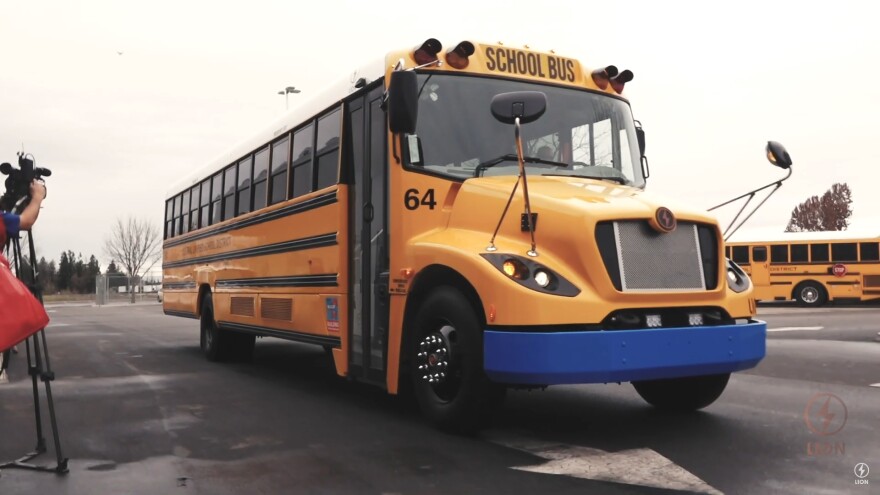New public-transit and school buses that run on electricity and alternative fuels would get much of Florida’s share of a federal payout from a Volkswagen emissions scandal, under a plan rolled out Tuesday by the state.
The Florida Department of Environmental Protection issued what is known as a request for information on a $116.4 million initiative intended to voluntarily remove older buses from the road, with Jacksonville being one of the state's “air quality priority areas.”
The funding would account for 70 percent of the money Florida is slated to receive from the 2017 settlement over allegations that Volkswagen violated emissions requirements.
Related
- Gov. DeSantis Plans More Electric Charging Stations For Florida's Highways
- JTA To Roll Out Solar Powered Jacksonville Electric Bus Service
The Florida Conservation Voters Education Fund called the request for information “a victory for climate action.”“Every day, diesel school buses expose 2.7 million Florida students to toxins and known carcinogens,” Aliki Moncrief, the fund’s executive director, said.
Moncrief said her group has spent two years pushing for the settlement dollars to go to “clean electric” school buses.
“The governor listened,” Moncrief said. “Today’s commitment to clean energy will help leave our children with a better world, both by cleaning their air and reducing carbon emissions that contribute to climate change.”
Potential applicants have until Nov. 7 to express interest in the program, which will help the Department of Environmental Protection determine “the scope of available funding and timing of projects,” the request said.
The initiative, in part, would cover up to 100 percent of the cost of new government-owned buses and privately owned buses under contract with public schools, transit and shuttle programs. Along with electric-powered vehicles, money could go to buses that run on fuels such as propane and compressed natural gas.
For buses used by other private entities, the state would cover up to 75 percent of the cost for new all-electric vehicles and 25 percent of the cost of new vehicles using alternative fuels.
The state is also moving forward immediately with $5 million in offering --- on a first-come, first-served basis --- to fully fund the replacement of 2009 and older diesel school buses with electric battery-powered school buses and associated charging infrastructure.
A priority for that initial replacement program would be designated “air quality priority areas,” which include Jacksonville, Miami, Broward County, Palm Beach County, Tampa, St. Petersburg, Orlando and Pensacola.
"The JTA see this as a potential funding opportunity that we plan to take advantage of through the application process," said JTA spokesman David Cawton II.
JTA has been actively moving toward lower-emission buses, with many of its buses now running on compressed natural gas.
Duval County Public Schools contracts its transportation services from private companies so it won't be directly applying for the grant money, but the district still plans to be involved. "We will be participating in the informational session to determine if the program has relevance to our arrangements for outsourced student transportation," said spokeswoman Sonya Duke-Bolden.
Zero-emission electric buses have been gaining traction across the country. One of the largest electric bus manufacturers, Proterra, has customers in 41 U.S. states and Canadian provinces.
Historically, range was an issue for electric buses but that's changing. Lion Electric Co., which makes zero-emission school buses, says its electric vehicles can be equipped to go up to 155 miles between charges.
Florida's bus money is part of the $166 million the state received as its share of the $14.7 billion settlement between Volkswagen and the U.S. Department of Justice.
The federal government said the German automaker installed software in its 2.0-liter diesel engine vehicles that disabled emission controls under normal use. The emissions-control devices were alleged to turn on when being tested. The result of the disabled emission controls was improved fuel mileage and driving performance but the release of thousands of tons of nitrogen oxide emissions in excess of regulated limits.
In July, Gov. Ron DeSantis announced that $24.9 million of the settlement, or 15 percent, would go toward placing charging stations for electric vehicles at all Florida Turnpike service plazas by the end of the year, with similar infrastructure along other major highways.
Another 15 percent would be directed to a state grant program of the U.S. Environmental Protection Agency’s Diesel Emissions Reduction Act, which is designed to reduce diesel emissions from engines that weren’t made to meet more stringent post-2006 emission standards.


